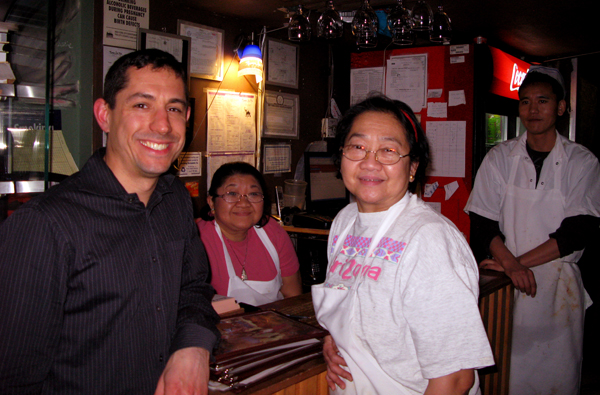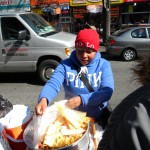
Charles Bibilos with Chef Jeannie Ongkeo (right) at Mangez Avec Moi in TriBeCa. (Photo: Aurora Almendral)
Chef Jeannie Ongkeo of TriBeCa’s Mangez Avec Moi stood at the head of the table explaining to a fixated group of about 15 people a very specific diet. Never anything cold, no meat, no sweets. Nothing but thick, sticky Laotian rice, some grilled galangal and hot water. Do this for a month, she explained sagely, and you’ll be completely recovered from childbirth.
As we ate, Chef Jeannie regaled us with more nuggets of Lao culture. While placing heaping bowls of dill-infused stewed greens, platters of sausage and raw vegetables, dishes of fried fish eggs, and ramekins of very spicy, very pungent, homemade anchovy paste on the table, she was bubbling with information.
Laotians eat with their hands – never with forks. In Laos, women live to be 103, because they only eat Lao food and never canned food. Lao food fills your stomach, not like McDonald’s, which leaves your belly feeling loose, she explained while miming a flapping midsection. Lao papaya salad is spicy, not like the papaya salads in the rest of Southeast Asia, which are sweet and sour, Ongkeo said, with more than a hint of culinary competitiveness.
Her audience was brought to the restaurant by Charles Bibilos, 34, a private tutor who moved to New York in 2010. He could think of no place more diverse or full of immigrants than New York City, and he decided that the best way a for a kid who grew up in Ames, Iowa, to celebrate this was to eat an authentic meal from every country in the world. He’s recording his progress on his blog, “The United Nations of Food.” The Lao meal was meal number 112.
Concocting strict rules regarding authenticity, like the national origin of the hands that cook the meal (a Nigerian cooking Kyrgyz food doesn’t count), Bibilos’ ambition was only humbled by the limits of practicality. Chasing down an expat from countries with a population of less than 1 million seemed statistically difficult, so sovereign states like the Holy See (population 800) or Kiribati (population 102,000) were ruled out.
There is still plenty of digging to be done, and Bibilos relishes a good food challenge. He considers it too easy to just walk into a restaurant and simply order something from the menu. In the last two years, Bibilos has eaten Estonian herring (washed down with plenty of vodka) at a members-only social club and savored food from a dozen African countries, including Chad, the Sudan, and Somalia, cooked by the members of the United Nations African Mothers Association. He’s gone into people’s homes for a meal and estimates that he’s been to 80 or 90 different subway stops, many of them deep in New York City’s outer boroughs. He’s even uncovered a phenomenon he calls the “food closet.”
A restaurant in the food closet is one that masks its true national identity behind a more palatable, familiar one, like Algerian cooking hiding behind a sign that says North African or Moroccan. A kitchen in the food closet might be full of Georgian cooks while masquerading as a Russian restaurant.
Chef Jeannie is in the food closet. By day, Mangez Avec Moi serves the kind of standard Southeast Asian food geared to office workers looking for a quick lunch rather than a culinary adventure. On her regular menu you’l find the familiar pad thai, Vietnamese soups, variously colored curries, fried rice with pineapples and sweet papaya salad.
Bibilos found Chef Jeannie by following a string of rumors and clues. Someone mentioned to him that Mangez Avec Moi’s owner might be from Laos, and in a quick walk-by, he peeked inside the restaurant and spotted a decorative sign that read “Laos,” and a few bottles of Beer Lao in the refrigerator. When he went in to meet Chef Jeannie, she confirmed that she was in fact Lao.
Drawn out of her food closet, Chef Jeannie asked for a week to gather unusual Lao ingredients, then had free reign to serve us her choice of Lao dishes. Some of the food had a spice level and pungency a chef cooking for the average American palate wouldn’t normally strive for. The food seemed genuinely unique, even to me, a fellow Southeast Asian from a nearby country.
By the end of the night, the restaurant had emptied out, but Bibilos and Chef Jeannie were still talking about the food. Earlier in the evening, I’d asked him what his favorite meal had been so far. He was reluctant to answer, explaining that the UN of Food is more of a social experiment. It’s about the people he meets and the experiences he has — the food is just an excuse. From the excitement in Chef Jeannie’s voice, it seemed that the feeling was mutual.
Fi2W is supported by the New York Community Trust and the John S. and James L. Knight Foundation with additional support from the Ralph E. Odgen Foundation, the Mertz Gilmore Foundation and the Sirus Fund.




